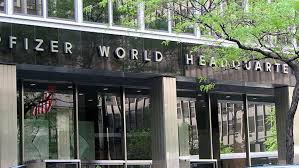Drug giant Pfizer and its partner BioNTech have begun an advanced trial of one of their experimental coronavirus vaccines in volunteers in the United States. The first four participants were dosed Monday at the University of Rochester Medical Center, a spokesman there said. The combined Phase 2/3 trial, which looks for safety, efficacy and optimal dosing of a vaccine or drug, will include up to 30,000 participants.
It was the second advanced trial of a coronavirus vaccine to get under way in the United States Monday. Earlier Monday, Moderna started a Phase 3 trial in the United States of its experimental vaccine. Pfizer’s vaccine is different, but also uses an experimental approach that employs genetic material to stimulate an immune response against a key part of the coronavirus.
Earlier this month, Pfizer and BioNTech released preliminary data showing that one of their vaccines, known only by its experimental name BNT162b1, appeared safe and elicited antibody and T-cell immune responses in a Phase 1/2 trial.
But the company has moved ahead with a slightly different candidate. This one will move forward in the combined Phase 2/3 trial, at about 120 sites worldwide, including 39 US states and Argentina, Brazil and Germany.
Pfizer’s coronavirus vaccines all use pieces of genetic material to prompt the vaccine recipient to make antibodies against specific parts of the coronavirus. Pfizer and BioNTech’s first vaccine targeted a piece of the spike protein, a structure the virus uses to infect human cells. The second vaccine, being moved into advanced trials, targets the entire spike structure.
“This decision reflects our primary goal to bring a well-tolerated, highly effective vaccine to the market as quickly as possible, while we will continue to evaluate our other vaccine candidates as part of a differentiated COVID-19 vaccine portfolio,” BioNTech founder Dr. Ugur Sahin said in a statement.
Moncef Slaoui, chief adviser to the US government’s Covid-19 vaccine effort, Operation Warp Speed, said building on earlier, tested vaccine platforms allows speedier development of vaccines while still being safe. “We’re selecting very carefully and thoughtfully vaccine technologies that are very likely to work, and work for us, because we know them somewhat,” Slaoui said Tuesday at the privately sponsored Disease Prevention and Control Summit.
Both versions of Pfizer’s vaccine elicit antibody responses as well as immune cells called T-cells, the company said. If a vaccine activates both arms of the immune system the hope is it will be more effective and provide more durable protection.
A Phase 1 study typically involves a small number of people and focuses on whether a vaccine is safe and elicits some kind of immune response. In Phase 2, the clinical study is expanded and the vaccine is given to people who have characteristics — such as age and physical health — similar to those for whom the new vaccine is intended, according to the US Centers for Disease Control and Prevention. In Phase 3, the vaccine is given to thousands of people and tested for efficacy and again for safety.

